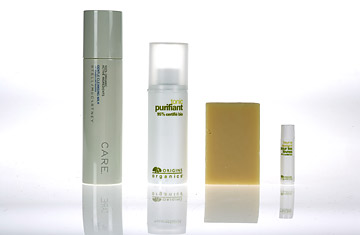
From left to right: Gentle Cleansing Milk from Care by Stella McCartney; Purifying Tonic, Cleansing Body Bar, and Soothing Lip Balm from Origins Organic.
O.K., so perhaps a passion to save the earth and leave the teeniest possible carbon footprint isn't at the top of a beauty junkie's priority list. When it comes to cosmetics, it's all about trends, not trees. And let's face it, if you've finally discovered the creamiest cleanser or the perfect shade of lip gloss, does it really matter that it isn't made with renewable, eco-friendly ingredients?
Well, as it turns out, it does—to more and more consumers. With eco-chic firmly established on the runway—thanks to organic fashions from the likes of Stella McCartney and earth ambassador Bono—organic products are continuing their march out of the kitchen and straight into the beauty drawer. Globally, sales of natural and organic cosmetics reached an estimated $7 billion last year, according to Organic Monitor, a British company that tracks the growth of the organic market. And those sales, which have included familiar botanical brands such as Burt's Bees, the Body Shop, Nature's Gate and Origins, have been growing 20% annually and are expected to double in market share in the coming years. Some of that growth will be driven by brands already known for their reliance on botanicals and natural ingredients that are now turning to organics. Aveda's founder is developing a new line of head-to-toe organic products under the Intelligent Nutrients label, while Kiehl's will soon market its first product with a certified (by EcoCert, the European seal of eco-friendliness) organic ingredient, argan oil, sourced from Morocco and coveted for its rich moisturizing effects.
Additional growth will come from newcomers, brands that traditionally haven't been known to tout the importance of natural ingredients in their products. McCartney paired up with Yves Saint Laurent (YSL) Beauté last year to launch an organic skin-care line, Care, while France-based L'Oréal (which now owns YSL Beauté) recently acquired Sanoflore, a producer of several dozen organic face and body products. Estée Lauder, which owns Origins, hit beauty counters with Origins Organics last year. "We certainly were seeing the organic movement in the food industry, and we wanted to bring that kind of choice to the [beauty] consumer," says Lynn Mazzella, vice president of global product development for Origins.
Navigating among those choices, however, is another matter. Driving the trend for eco-conscious beauty is the same consumer obsession with natural—and increasingly, environmentally responsible—ingredients behind the organic-food movement. But there are currently no mandated government standards defining organic when it comes to cosmetics. The Food and Drug Administration regulates the safety of beauty products, but the U.S. Department of Agriculture (USDA) oversees the labeling of anything claiming to be organic, be it a berry or a body lotion. "If any product meets the USDA organic standards for production, handling and labeling, then it is eligible for USDA organic certification," says Joan Shaeffer, spokeswoman for the agency. "We don't care if you eat it or shampoo your hair with it." And adhering to the USDA's criteria, called the National Organic Program (NOP), is strictly voluntary. Even more important, note skin experts, the NOP is a marketing program, not a safety rating, so earning the USDA's organic seal does not necessarily mean a potion won't cause an allergic reaction or a flare-up of dermatitis.